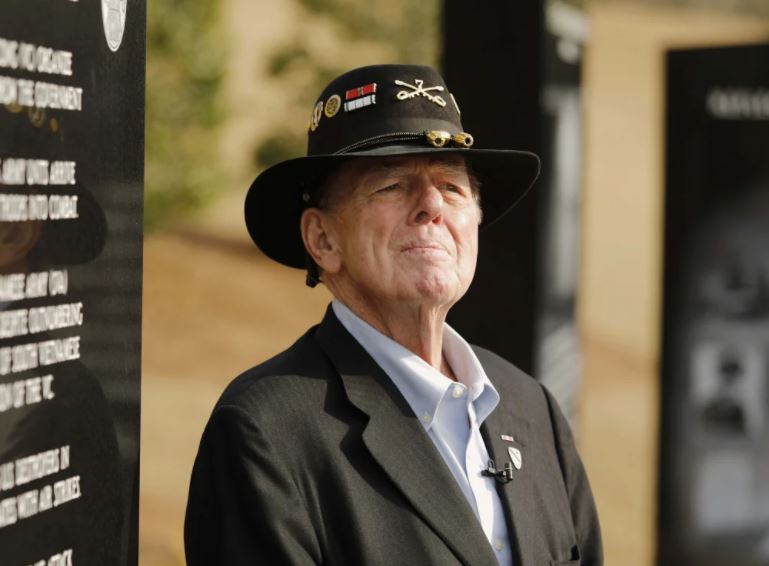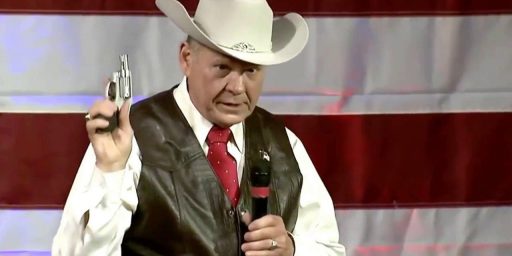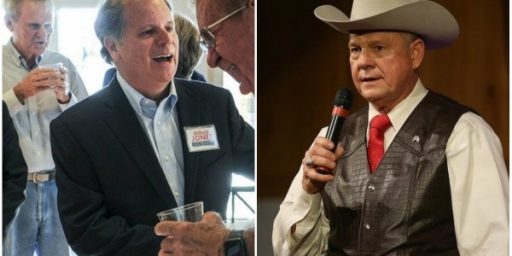Joseph Galloway, 1941-2021
A legendary journalist is gone.

WaPo (“Joseph Galloway, chronicler and champion of soldiers in Vietnam, dies at 79“):
In November 1965, journalist Joseph L. Galloway hitched a ride on an Army helicopter flying to the Ia Drang Valley, a rugged landscape of red dirt, brown elephant grass and truck-size termite mounds in the Central Highlands of South Vietnam. Stepping off the chopper, he arrived at a battlefield that one Army pilot later called ”hell on Earth, for a short period of time.”
Mr. Galloway, a 24-year-old reporter for United Press International, went on to witness and participate in the first major battle of the Vietnam War, in which an outmanned American battalion fought off three North Vietnamese army regiments while taking heavy casualties. He carried an M16 rifle alongside his notebook and cameras, and in the heat of battle, he charged into the fray to pull an Army private out of the flames of a napalm blast.
“At that time and that place, he was a soldier,” Maj. Gen. Joseph K. Kellogg said more than three decades later, when the Army awarded Mr. Galloway the Bronze Star Medal for his efforts to save the private. “He was a soldier in spirit, he was a soldier in actions and he was a soldier in deeds.”
Mr. Galloway later recounted the battle in a best-selling book, “We Were Soldiers Once . . . and Young” (1992), written with retired Lt. Gen. Harold G. Moore, the U.S. battalion commander at Ia Drang. The book was adapted into the movie “We Were Soldiers” (2002), starring Mel Gibson as Moore and Barry Pepper as Mr. Galloway, and was acclaimed for its unflinching account of one of the war’s bloodiest battles.
“What I saw and wrote about broke my heart a thousand times, but it also gave me the best and most loyal friends of my life,” Mr. Galloway said in a 2001 interview with the Victoria Advocate, the Texas daily where he had once worked as a cub reporter. “The soldiers accepted me as one of them, and I can think of no higher honor.”
Mr. Galloway, whose reporting took him from the jungles of Vietnam to the halls of the Kremlin and the deserts of Iraq, was 79 when he died Aug. 18 at a hospital in Concord, N.C. The cause was complications from a heart attack, said his friend and former editor John Walcott.
In a journalism career that spanned nearly five decades, Mr. Galloway became known for writing elegant, richly detailed stories that immersed readers in conflicts around the world, including the 1971 war between India and Pakistan and the 1991 Persian Gulf War, which he covered while embedded with a tank unit for U.S. News & World Report.
A native Texan who grew up reading the collected reporting of Ernie Pyle, who told the story of World War II through the eyes of ordinary GIs, Mr. Galloway exalted the bravery of American soldiers even as he questioned the wisdom of the leaders who sent them into battle. Gen. H. Norman Schwarzkopf, who led U.S. forces during the Gulf War, once called him “the finest combat correspondent of our generation — a soldiers’ reporter and a soldiers’ friend.”
Mr. Galloway spent 22 years with UPI and retired in 2010 after working as a military affairs correspondent and columnist for the newspaper chains Knight Ridder and McClatchy, where he wrote critically of the Afghanistan and Iraq wars. He was played by Tommy Lee Jones in director Rob Reiner’s movie “Shock and Awe” (2017), about Knight Ridder’s skeptical coverage of the George W. Bush administration’s case for invading Iraq.
The Battle of Ia Drang took place November 14-19, 1965. I was born smack in the middle of it at an Army hospital in Virginia. My dad would deploy to Vietnam while I was still in diapers, albeit in a combat support role.
Galloway’s reporting was legendary and he was, of course, made famous by his book with Hal Moore and the subsequent movie. Vietnam produced quite a number of famous correspondents but he was indeed the most revered, at least by the troops he covered.
There have been a lot of wars in the years since Vietnam, although none on anything like the same scale. While there continue to be many American journalists who risk their lives covering those wars, it’s unlikely we’ll ever see the likes of Galloway again. Partly, that’s simply a function of both the wars themselves and the new media landscape. But it’s also true that the professional force—scarred by a false since that they lost Vietnam partly because of gotcha coverage from the press corps—has been alternately hostile to the media or seeking to co-opt it via embedded coverage and other dog-and-pony shows that present a rosy picture of the conflict.





Thank you for posting this, Dr. J.
Galloway was old school. We’ll not see his like again. RIP, sir, RIP.
My husband, Michael Bohonak, was a young airborne infantry officer who was fortunate to have been moved into 1st Brigade headquarters as most of his fellow young officers were killed that he was with at Fort Benning. He died in May of 2019 from multiple medical issues, many I now know probably were the result of his Agent Orange exposure for which he had a partial disability. He is buried in Arlington National Cemetery. He respected Joseph Galloway, and no doubt was there to greet him with a host of other Vietnam vets. RIP but bet he is still active “up above” us.
Dr. Noni Bohonak